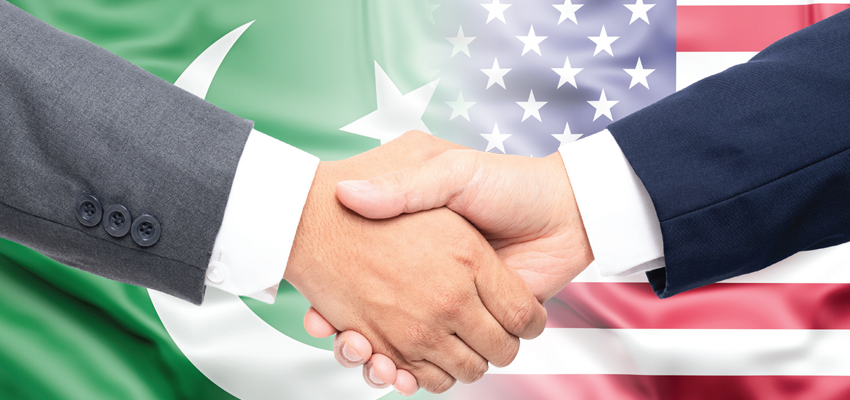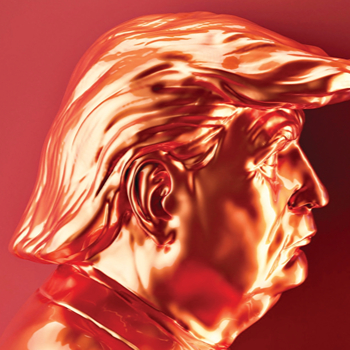NO FRIENDSHIP without self-interest

A private luncheon meeting between the US President and an army general, that too of a minor country like Pakistan was unthinkable. Yet it happened, with the US President Donald Trump and Pakistan Army Chief Asim Munir. What were the imperatives? It is all shrouded in mystery, but many a theory abound. Needless to say, America’s self-interest overrides all
The great statesman and philosopher of India, Chanakya said, "There is some self-interest behind every friendship—there is no friendship without self-interest. This is the bitter truth". This ancient principle is much more visible in the American foreign policy, where it seems to be a matter of costs and benefits. America does not have friends, it has interests. The recent White House lunch meeting of the U.S. President Donald Trump with Pakistan Army Chief Asim Munir, is an illustration of that.
It was the first such meeting in the White House between the U.S. president and an army chief of any country. Earlier, General Ayub Khan and General Yahya Khan of Pakistan had such meetings, but they had already ushered in power and had become heads of the country; unlike General Munir, who is still a serving General. In his first Presidency, Trump had said that Pakistan had cheated America and had done double dealings. His immediate predecessor, President Joe Biden too had said that Pakistan is a dangerous country. It is also a well-known universal fact that Pakistan is a haven for international terrorists. Even Osamabin-Laden was found there by the U.S.
State policy of terrorism
It is the state policy of Pakistan to nurture terrorists, and this fact has been publicly accepted by the defence minister of Pakistan. India has always been a victim of the export of terrorists by Pakistan, and the world knows it. In this context, the meeting of Trump with Munir may look surprising, but the fact remains that it has been in pursuance of American interests. Let us see, how.
The Trump-Munir luncheon was a close door meeting for two hours without any media presence. Even the Interior Minister of Pakistan was made to sit in the waiting room. Munir was only accompanied by the Pakistan's ISI Chief. After the meeting, Trump said that he loved Pakistan and that he wanted to thank Munir, as he had helped in bringing a ceasefire to the recent war with India (Operation Sindoor). There are several reported reasons for the meeting, and it definitely was not a thanksgiving engagement.
To seek airspace
First, it might have been to seek airspace—access to Pakistan's airspace and its airports for America’s possible action against Iran, as the Israel-Iran war had already begun. Pakistan shares a border of 100 km with Iran, and America could have needed access from Pakistan's side. Before the lunch meeting, Pakistan had voiced its support for Iran. It is well known that Pakistan was always open for sale—probably America wanted to buy its services, and knowing that the army was the de facto ruler of Pakistan, the army general was invited. America did send its planes to attack Iran, but the extent to which Pakistan was used is not known so far.
Crypto deal
Second, the family business firm of Trump had recently done a big crypto business deal with Pakistan, where Munir was involved. It has been reported, the meeting was in this context. The deal had taken place in Pakistan just four days after the Pahalgam attack, and since then Trump's tone for Pakistan had undergone a change. It’s well known that the crypto business is a big source of income for the Trump family, and his change of behaviour after this deal gives credence to the fact that this meeting with Munir was for the crypto deal.
Matter of minerals
Third, it is said that minerals, including the critical minerals of Balochistan (province of Pakistan), was on the table for the meeting. Trump as a businessman president wanted to have a U.S.- Pakistan deal in this regard. This issue has been in discussion in Pakistan, and hence it sounds logical that this might have been one of the items on the agenda for the lunch meeting. The Balochistan liberation leaders have spoken in this regard that their minerals are not for sale.
Weaving its interest
Fourth, America does not like that Pakistan should be sitting in the lap of China and that as per its strategic needs, it wants Pakistan to be its closer ally. At the same time, America may not be liking India's growth both economically and militarily, and hence the use of Pakistan against India. The U.S. weighs its interest and the proceeds with its foreign policy. The statement of a senior U.S. general creates this doubt, as he said during Munir's visit that Pakistan is a close partner in its anti- terrorism activities. A terrorist country being given the highchair for antiterror work directly hurts India.
Peacenik posture
Fifth, the lunch meeting was crafted by Trump and assisted by Munir, to showcase his image of a peace-deal maker. After Operation Sindoor was started by India and then its pause at the request of Pakistan, Trump has been repeatedly saying that he got the ceasefire brought about between two nuclear powers, thus stopping a dangerous war. Trump, in fact, defied the Government of India stand that there was no mediation to halt the war. Finally, our Prime Minister also directly spoke to Trump on a phone call a day before the lunch meeting with Munir, but Trump's one-sided speak did not get a halt. He continued his stance in his quest for a 'Nobel Peace Prize' and Munir even spoke on his behalf, and placed on record Pakistan's request for Trump’s candidature for this prize. However, after the U.S. bombings of Iran, Pakistanis themselves are speaking against their government and particularly Munir.
If examined historically, it will be observed that America has always worked for its interest while pursuing its foreign policy. America is geographically located in a peaceful zone as on either side of it there are oceans and so there is no fear of any attack on it. Still, it is also true that America has been involved in most of the world’s wars these days. The latest are the big attacks on Iranian nuclear facilities by its B-2 Bombers with the world’s heaviest bombs.
There is no friendship without self-interest'- this ancient principle is much more visible in the American foreign policy where it seems to be a matter of costs and benefits. America does not have friends. It has interests
Brazen hegemony

The interest this time has changed as it wanted to be the only leader of oil rich West Asia. Most of the rich countries in the Arab world are already under the hegemony of the U.S., as evidenced by the recent visits to this part of the world, and Iran was the exception. The bombings and now peace talks are aimed at luring Iran and bring it also under its control.
The Iraq war of 2003, which was started by the U.S. and supported by its allies, was also a brazen example of U.S. self-interest. The excuse for the war was that Iraq possessed ‘weapons of mass destruction’, but truth was that these were never found. Saddam Hussein who ruled over Iraq was deposed and killed by America, and thereafter puppet governments were established sequentially, that would help the U.S. What did America need? The oil of Iraq, and the sale of its weapons. Once both these interests were served, the war was over.
Similarly, the long Afghanistan aggression with the Taliban was also in self interest, and never for global peace. The duration of this action extended from October 2001, and ended after 20 years in 2021. The regime was handed over to the Taliban and thus there was no different outcome to the war.
America seeks economic, political and hegemony goals while undertaking wars, though the same are never needed for its security. The one biggest example of this was the Cold War with Russia (earlier USSR). The U.S. wanted to control the communist world and propagate its capitalist philosophy. The USSR was a big power bloc of the communist world, which continued from 1922 to 1991. The U.S. never liked it, as militarily it was a very powerful bloc, and it also declined to fall under its control. The Cold War finally dismantled USSR and 14 countries emerged out of its dissolution. The U.S. interest was served.
Deep State gambits
Sometimes, war is not necessary for America. Its powerful Deep State can serve its interests. The various good-named revolutions like ‘Velvet Revolution’, ‘Jasmine Revolution’ etc. have served the American purpose of change of regimes in the name of helping democracy. The most recent change of government in Bangladesh was orchestrated by the American Deep State. The U.S. gave a proposal to then government led by Sheikh Hasina that it wanted to establish a military base in Saint Martins Island of Bangladesh. The proposal was rejected by Sheikh Hasina. So, the Deep State brought an apparent revolution by the students against the Bangladesh government. The government was toppled, and Sheikh Hasina ran away to India for her life. Now an American aided government of Muhammad Yunus leads in Bangladesh.
India, no tool
Many of us Indians feel disappointed by the behaviour of America. We, the biggest democracy is seen being equated with Pakistan, a terrorist country, by the U.S. The champion of democracy, America, is not against us, but its interests are not served by India, but by Pakistan. For the U.S., its strategies are important for its global interest and Pakistan’s geography fits in its strategies. Pakistan works as a tool, while India does not. India is growing as an economically powerful country, but it is not of use to America, while Pakistan is ever ready to do its dirty work for money. Many a times, Pakistan has done many a dirty work for America in its mission against the Soviet Union, and this fact has been accepted by the defence minister of Pakistan. We are a country with noble principles, and for us, the world is one big family, but we are not a country that America can use for its needs.